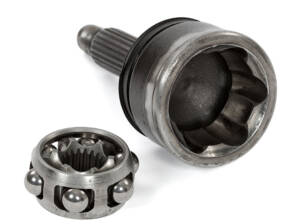
Cold forming, optimized by a conversion layer on the metal surface, represents a traditional approach to manufacturing that combines precision and durability.
Traditional methods for this forming process rely on additional heating and the addition of a conversion layer such as phosphating, which requires additional process steps and increases complexity.
The phosphate conversion layer acts as a protective shield for the metal, preventing corrosion and increasing its resistance to wear. It acts as a barrier against environmental influences and ensures that the formed metal maintains its integrity even under challenging conditions. On the other hand, conversion layers such as phosphates can often contain chemicals that can cause environmental problems. The production and use of phosphates can contribute to water pollution and eutrophication and negatively impact ecosystems.
Also, the conversion layer processes often require a lot of energy and sometimes additional surface cleaning processes to perform additional long-term coatings or other heat treatment operations.
After many years of research and development, B&S has managed to develop high-performance lubricants that enable cold forming WITHOUT a conversion layer. Our lubricants, WITHOUT the need for phosphating, are a breakthrough for various industries, contributing to energy efficiency, reducing waste and improving production capacity.
Eliminating the phosphating process directly reduces energy consumption, as this step typically involves high temperatures and chemical treatments. Not only does this result in a lower environmental impact, but it also means cost savings for manufacturers.
The absence of phosphating also means a reduction in waste production. Phosphating processes often produce by-products that must be disposed of carefully and in an environmentally friendly manner, and avoiding this step simplifies the production process and minimizes the environmental footprint.
In addition, the use of such a lubricant can increase production capacity. Without the time-consuming phosphating process, manufacturing cycles can be shortened, resulting in increased efficiency and production performance. This is particularly crucial in industries where production speed plays a critical role.
Selecting lubricants that provide effective performance without the need for additional surface treatments is consistent with sustainable and environmentally friendly practices. This is a clear commitment to developing lubricants that not only improve operational efficiency, but also minimize the environmental impact of industrial processes.
